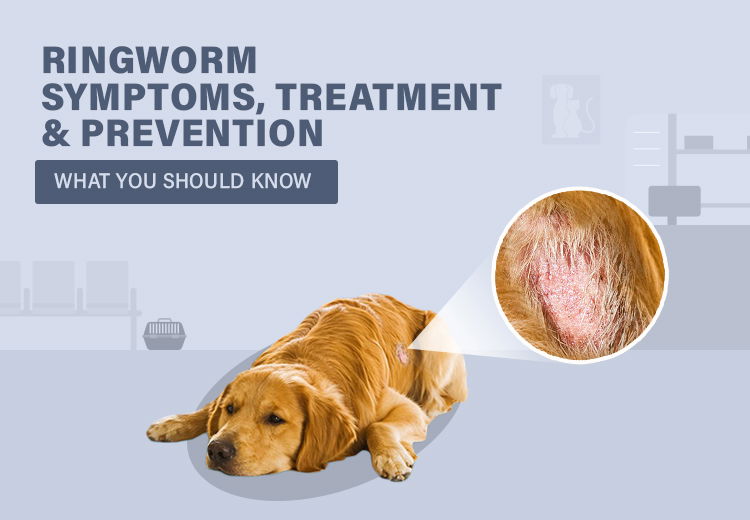 Aug 21, 2024
Aug 21, 2024

Ringworm is a common fungal infection in dogs Although, ringworms are not fatal, if not treated, ringworms can cause discomfort, hair loss and may lead to serious skin infections. Therefore, it is crucial for dog parents to recognize the signs, understand the causes, and know their treatment options. This blog provides all the key information you should know about ringworms in dogs. Let’s get started!
Ringworm is a fungal infection in dogs that affects the skin, hair and nails. Despite its name, it is not caused by a worm but by dermatophytes, a type of fungus. In dogs, there are numerous ringworm species amongst which 70% of ringworm cases are caused by Microsporum canis, 20% by Microsporum gypseum, and 10% by Trichophyton mentagrophytes.
Ringworm is highly contagious and can spread through direct contact with an infected animal or person. Dogs can contract it by coming in contact with contaminated objects like bedding, grooming tools or furniture. It affects their ears, face, tail, and feet.
Yes, ringworms can spread from animals to humans. Ringworm can affect anyone, but older individuals, children, and people with poor immunity are more susceptible. It presents as a round, red, and itchy rash on the human body.
Recognizing the symptoms of ringworm early is crucial. Common signs to look out for in your dog include:
These symptoms can appear anywhere on the dog’s body but are often most noticeable on the head, ears and feet.
Veterinarians use several methods to diagnose ringworm. Some of the important methods are listed below:
Wood Lamp Examination: Wood's lamp uses long-wave ultraviolet light to detect Microsporum canis that cause ringworm infections, detecting 72% of active skin lesions 5-18 days after infection.
Fungal Culture: A fungal culture, also known as a DTM (dermatophyte test medium), involves collecting hairs, scales, or scabs and allowing them to grow on a medium. Vets examine this growth under a microscope to detect ringworm.
PCR (Polymerase Chain Reaction) Testing: PCR testing is a fast, efficient method for diagnosing ringworm by detecting fungal DNA on hairs, but it's not suitable for follow-up testing as it can't differentiate between DNA and living fungi.
Ringworm can be treated and curable if all treatment, quarantine, and cleaning procedures are followed properly. Let’s take a look:
When your dog is receiving treatment for ringworm, keep them away from other pets and family members. Quarantine them in an easy-to-clean room free of wood floors and rugs.
Topical treatments include Lime Sulfur dips and antifungal shampoos, with Lime Sulfur dips being more effective. Antifungal shampoos, often combined with disinfectants, are used twice weekly.
Oral treatments often combined with topical treatments, effectively treat ringworm infections by inhibiting fungus reproduction and spreading.
Preventing ringworm involves good hygiene practices and regular care. Here’s how you can safeguard your dog from ringworm infections:
With timely and appropriate treatment, ringworm typically does not cause long-term damage. Ringworms rarely cause serious problems in dogs as it is preventable and curable. However, if left untreated it can lead to deep wounds and secondary skin infections.
Final Note
To sum up, knowing the signs, causes, and treatments for ringworm in dogs is crucial for pet parents. Early recognition of symptoms helps start treatment quickly. Regular vet visits, keeping pet areas clean, and handling pets safely can prevent ringworm. With good care and quick action, most dogs can recover from ringworm without lasting problems.
 Oct 24, 2024
Oct 24, 2024
Cats are little aloof fur balls that like to stroll around and enjoy their own company. But that doesn’t mean they are safe from pesk...
 Oct 10, 2024
Oct 10, 2024
Halloween is the perfect time of the year to bring out your freak and share it with your loved ones. Sweets, snacks, and drinks are the obv...